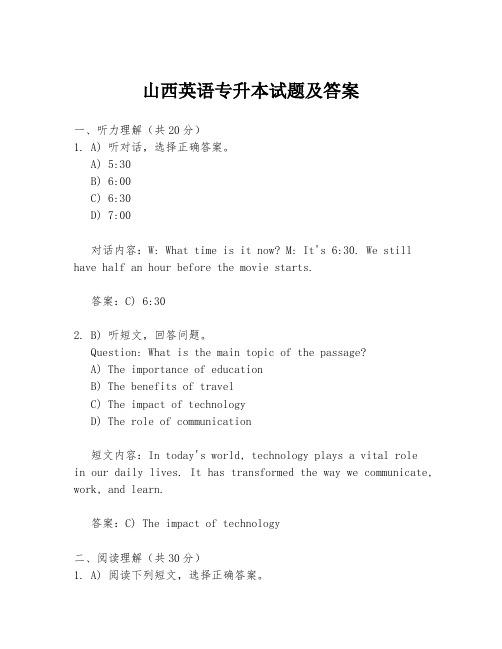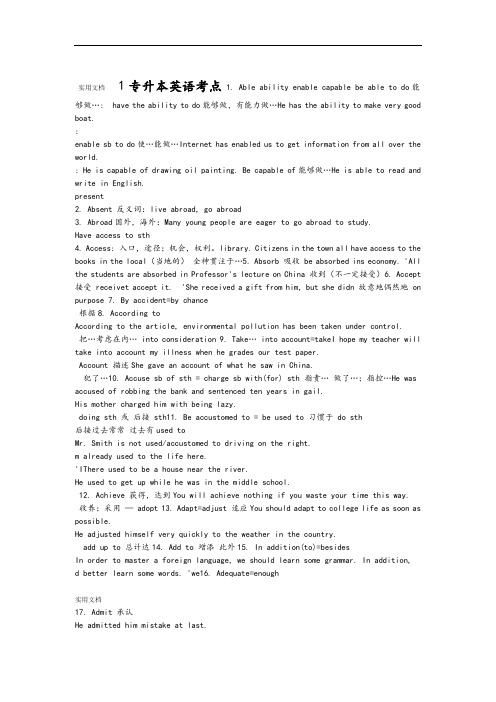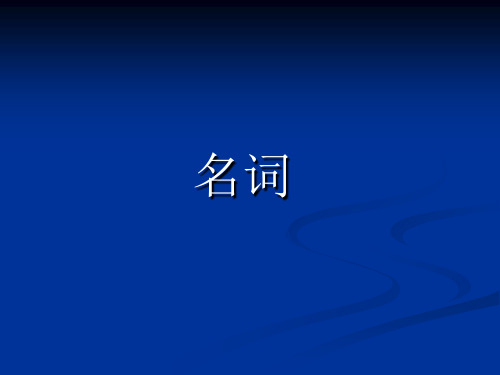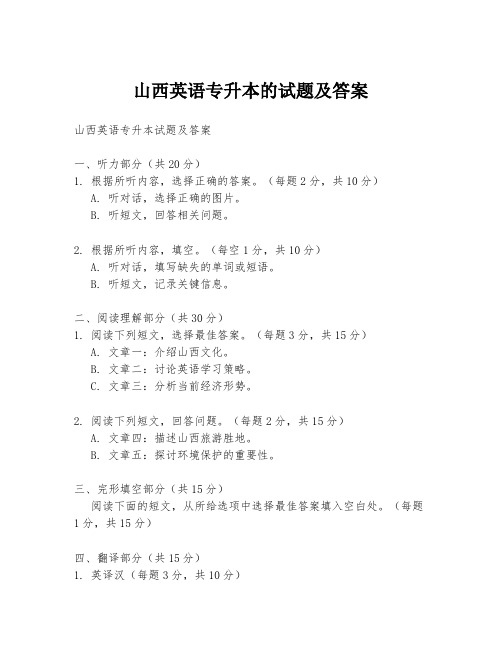山西专升本考试英语考点汇总
专升本英语语法与词汇知识点总结

专升本英语语法与词汇知识点总结在专升本的英语考试中,语法和词汇是两个至关重要的部分。
掌握好这两方面的知识,对于提升英语成绩和语言运用能力有着举足轻重的作用。
下面,我将为大家详细总结专升本英语中常见的语法和词汇知识点。
一、语法知识点(一)动词时态1、一般现在时表示经常发生的动作、存在的状态或客观真理。
其构成是主语+动词原形(当主语是第三人称单数时,动词要加“s”或“es”)。
例如:“He often goes to school by bike”2、一般过去时表示过去发生的动作或存在的状态。
构成是主语+动词的过去式。
如:“I played basketball yesterday”3、现在进行时表示正在进行的动作。
其结构是“主语+ be 动词+动词的现在分词”。
比如:“They are watching TV now”4、过去进行时强调过去某个时间正在进行的动作,形式为“主语+ was/were +动词的现在分词”。
像:“I was reading a book at that time”5、现在完成时表示过去发生的动作对现在造成的影响或结果,或者从过去开始一直持续到现在的动作。
其构成是“主语+ have/has +过去分词”。
例如:“She has learned English for five years”6、过去完成时表示过去某个时间之前已经完成的动作,结构是“主语+ had +过去分词”。
比如:“By the end of last year, we had learned 2000 words”(二)语态1、主动语态主语是动作的执行者。
例如:“He opened the door”2、被动语态主语是动作的承受者,构成是“be +过去分词”。
如:“The door was opened by him”(三)非谓语动词1、动词不定式具有名词、形容词和副词的特征,可作主语、宾语、定语、状语等。
山西英语专升本试题及答案

山西英语专升本试题及答案一、听力理解(共20分)1. A) 听对话,选择正确答案。
A) 5:30B) 6:00C) 6:30D) 7:00对话内容:W: What time is it now? M: It's 6:30. We still have half an hour before the movie starts.答案:C) 6:302. B) 听短文,回答问题。
Question: What is the main topic of the passage?A) The importance of educationB) The benefits of travelC) The impact of technologyD) The role of communication短文内容:In today's world, technology plays a vital rolein our daily lives. It has transformed the way we communicate, work, and learn.答案:C) The impact of technology二、阅读理解(共30分)1. A) 阅读下列短文,选择正确答案。
短文:The rise of the internet has revolutionized the way we access information and communicate with each other. With the click of a button, we can now connect with people fromall over the world.问题:What is the main idea of the passage?A) The internet has made communication easier.B) The internet is a source of information.C) The internet has changed the world.D) The internet is a tool for revolution.答案:C) The internet has changed the world.2. B) 阅读下列短文,回答问题。
英语专升本语法知识点汇总

英语专升本语法知识点汇总一、时态。
1. 一般现在时。
- 用法:- 表示经常或习惯性的动作或存在的状态。
例如:I go to school by bike every day.(我每天骑自行车去上学。
)- 表示客观事实或普遍真理。
例如:The earth moves around the sun.(地球绕着太阳转。
)- 结构:- 主语为第三人称单数(he/she/it等)时,动词要加 -s或 -es,如He likes reading. 其他人称用动词原形,如I like reading.2. 一般过去时。
- 用法:- 表示过去某个时间发生的动作或存在的状态。
例如:I visited my grandparents last weekend.(我上周末去看望了我的祖父母。
)- 结构:- 动词一般用过去式形式。
规则动词的过去式一般在词尾加 -ed,如work - worked;不规则动词有其特殊的过去式形式,如go - went。
3. 一般将来时。
- 用法:- 表示将来某个时间要发生的动作或存在的状态。
例如:I will go to Beijing next month.(我下个月将去北京。
)- 结构:- 常见的结构有will+动词原形,be going to+动词原形(表示计划、打算做某事或有迹象表明即将发生某事)。
如He is going to have a party tonight.(他今晚打算举办一个聚会。
)4. 现在进行时。
- 用法:- 表示现在正在进行的动作或存在的状态。
例如:She is reading a book now.(她现在正在读一本书。
)- 结构:- be动词(am/is/are)+动词的 -ing形式。
5. 过去进行时。
- 用法:- 表示过去某个时刻或某段时间正在进行的动作。
例如:I was watching TV at 8 o'clock last night.(昨晚8点我正在看电视。
山西专升本学位英语考试真题及答案

山西专升本学位英语考试真题及答案Shanxi University Undergraduate English Exam Questions and AnswersPart I: Reading ComprehensionPassage 1:No one knows when tea was first drunk. But it seems certain that the Chinese have been doing so longer than anyone else. The American historian Lo Fungo suggests that the Chinese were enjoying their tea as early as 2700 years before the birth of Christ.1. Why is the history of tea-drinking difficult to trace?A) Because the Chinese have been drinking tea longer than anyone else.B) Because tea was first drunk by the Chinese and they have kept no records.C) Because the history of China goes back thousands of years.Answer: B) Because tea was first drunk by the Chinese and they have kept no records.2. According to Lo Fungo, when did the Chinese start enjoying tea?A) 2700 years before the birth of Christ.B) During the birth of Christ.C) 2700 years after the birth of Christ.Answer: A) 2700 years before the birth of Christ.Passage 2:As teenagers reach puberty, their social habits often go through a dramatic change. They become more independent from their parents and begin to form stronger bonds with their peers. Research has shown that peer influence can be both positive and negative during this crucial stage of development.3. What happens to teenagers as they reach puberty?A) They become more dependent on their parents.B) They form stronger bonds with their siblings.C) They become more independent from their parents and bond with their peers.Answer: C) They become more independent from their parents and bond with their peers.4. According to research, what impact can peer influence have on teenagers?A) PositiveB) NegativeC) Both positive and negativeAnswer: C) Both positive and negativePart II: WritingWrite an essay of 300 words on the following topic:"Should students be allowed to have cell phones in school?"Many schools have strict policies in place banning students from using cell phones during school hours. However, some argue that cell phones can be useful tools for learning and communication. In my opinion, students should be allowed to have cell phones in school for the following reasons.Firstly, cell phones can be used for educational purposes. With access to the internet and various educational apps, students can enhance their learning experience by conducting research, accessing online resources, and collaborating with their peers on group projects. Additionally, in case of emergencies,having a cell phone can provide students with a means of contacting their parents or authorities quickly.Secondly, cell phones can improve communication between students, teachers, and parents. By enabling instant messaging and voice calls, cell phones can facilitate communication and feedback on assignments, projects, and school events. This can help students stay connected and informed about important information regarding their education.In conclusion, I believe that students should be allowed to have cell phones in school as they can be valuable tools for learning, communication, and safety. Schools should consider implementing guidelines and rules to ensure responsible use of cell phones, rather than outright banning them.Part III: Listening ComprehensionListen to the following audio and answer the questions:Question 1: What is the man's favorite hobby?A) ReadingB) RunningC) SwimmingAnswer: A) ReadingQuestion 2: Where does the woman suggest going for vacation?A) BeachB) MountainsC) CityAnswer: B) MountainsThis concludes the Shanxi University Undergraduate English Exam Questions and Answers. Good luck with your exam preparation!。
专升本英语考点总结

专升本英语考点总结专升本英语考点总结专升本英语考试主要涉及四个方面的考点:词汇与短语、语法与句型、阅读理解和写作。
以下是详细的考点总结:1. 词汇与短语考点包括但不限于:- 基本词汇:包括常见的名词、动词、形容词和副词等。
如:book, run, happy, slowly等。
- 同义词与反义词:如:big和large, happy和sad等。
- 常用短语与习惯搭配:如:take a shower, make a decision等。
- 常见固定短语:如:in the meantime, as a matter of fact等。
- 词义辨析:如:raise和rise的区别。
2. 语法与句型考点包括但不限于:- 时态与语态:包括一般现在时、一般过去时、一般将来时等时态的用法,以及被动语态的用法。
- 句子结构与修饰成分:包括主谓宾结构、定语从句、状语从句等的构成和用法。
- 并列与复合句:包括并列句和复合句的构成和连接词的用法。
- 虚拟语气:包括虚拟语气的用法和常见表达方式。
3. 阅读理解考点包括但不限于:- 主旨理解:根据文章的主题和段落的主要内容进行理解和概括。
- 细节理解:根据文章中的具体信息进行理解和推断,如时间、地点、人物等。
- 推理判断:根据已知的信息进行推理和判断,如根据作者的观点和态度进行推断。
- 词义理解:根据文章中陌生词汇的上下文进行推断词义。
4. 写作考点包括但不限于:- 作文概要写作:根据提供的提示和要求进行概要的写作,要求简洁明了,有逻辑性。
- 短文填空:根据提供的文章内容和上下文的逻辑关系,填写合适的单词或短语。
- 改错:对文中的错误进行修改,要求准确地发现错误并给出正确的表达方式。
- 信息归纳:根据提供的材料进行信息的归纳和总结,要求提取主要信息并进行概括。
以上是专升本英语考点的总结,希望对你有所帮助。
祝你考试顺利!。
山西专升本考试英语考点汇总情况

实用文档 1专升本英语考点 1. Able ability enable capable be able to do能够做…: have the ability to do能够做,有能力做…He has the ability to make very good boat.:enable sb to do使…能做…Internet has enabled us to get information from all over the world.: He is capable of drawing oil painting. Be capable of能够做…He is able to read and write in English.present2. Absent 反义词:live abroad, go abroad3. Abroad国外,海外:Many young people are eager to go abroad to study.Have access to sth4. Access: 入口,途径;机会,权利。
library. Citizens in the town all have access to the books in the local(当地的)全神贯注于…5. Absorb 吸收 be absorbed ins economy. 'All the students are absorbed in Professor's lecture on China 收到(不一定接受)6. Accept 接受 receivet accept it. 'She received a gift from him, but she didn 故意地偶然地 on purpose7. By accident=by chance根据8. According toAccording to the article, environmental pollution has been taken under control. 把…考虑在内… into consideration 9. Take… into account=takeI hope my teacher will take into account my illness when he grades our test paper.Account 描述She gave an account of what he saw in China.犯了…10. Accuse sb of sth = charge sb with(for) sth 指责…做了…;指控…He was accused of robbing the bank and sentenced ten years in gail.His mother charged him with being lazy.doing sth 或后接 sth11. Be accustomed to = be used to 习惯于 do sth后接过去常常过去有used toMr. Smith is not used/accustomed to driving on the right.m already used to the life here.'IThere used to be a house near the river.He used to get up while he was in the middle school.12. Achieve 获得,达到You will achieve nothing if you waste your time this way. 收养;采用— adopt 13. Adapt=adjust 适应You should adapt to college life as soon as possible.He adjusted himself very quickly to the weather in the country.add up to 总计达14. Add to 增添此外15. In addition(to)=besidesIn order to master a foreign language, we should learn some grammar. In addition, d better learn some words. 'we16. Adequate=enough实用文档17. Admit 承认He admitted him mistake at last.18. In advance 预先,提前You should inform(通知) me in advance if you are going to come.19. Take advantage of = make use of 利用We can take advantage of computer to analyze data.A good habit in learning is to make full use of class time.20. Affect (v.) effect (n.) influence (v & n) 影响 effort 努力have an effect/influence on对…有影响make an effort to do或 make efforts to doThe latest discovery in gene will have a great effect on the health of human beings. They made great efforts to find a new cure to lung cancer .21. Afford (to do) sth 买/花/用/支付得起It's hard to imagine how he can afford (to buy) a house on his small salary.22. Be afraid of 担心,害怕23. At the age of24. Agree with 同意agree on 同意(双方就…达成一致)agree to 同意(上级,父母对下级,晚辈允许…)The two countries have agreed on the date for next talk.My parents don't agree to my staying outside overnight.25. Ahead of time 提前We finished our assignment ahead of time.26. By air=by plane by sea= by ship by bus/train on foot27. After all 毕竟 above all 首先 (not…) at all 一点(也不) all over28. Allow/permit … to do…允许…做…29. Although/though but 连词不能同时用在句子中。
山西英语专升本资料语法共22页

三、名词的数:
名词复数的规则变化 情况 构成方法 读音 例词 一般情况 加 -s 清辅音后读/s/ map-maps 浊辅音和元音后读 /z/ bag-bags /car-cars 以s, sh, ch, x等结尾 加 -es 读 /iz/ bus-buses/ watch-watches 以ce, se, ze,等结尾 加 -s 读 /iz/ license-licenses 以辅音字母+y结尾 变y 为i再加es 读 /z/ baby--babies
(2)只用复数的名词词组: take turns, as follows, in high spirits
(3) 在短语中单、复数均可的名词:
单、复数意义相同: make a face / make faces play a joke/ jokes on somebody have a talk/ have talks with somebody 单、复数意义不同: have a word with somebody have words with somebody
2. 不可数名词的数: ( 1 )数词或冠词+量词+ of +不可数名词
a drop of water , two cups of tea ( 2 )物质名词的复数表示类别或数量 fish鱼 –fishes 多种鱼 two coffees 两杯咖啡
3.名词单、复数的特殊用法:
(1)只用复数的名词: socks, scissors, trousers earnings, surroundings, greetings tears, wishes, thanks
people police cattle 等本身就是复数,不能 说 a people,a police,a cattle,但可以说a person,a policeman,a head of cattle, the English,the British,the French,the Chinese,
山西英语专升本的试题及答案

山西英语专升本的试题及答案山西英语专升本试题及答案一、听力部分(共20分)1. 根据所听内容,选择正确的答案。
(每题2分,共10分)A. 听对话,选择正确的图片。
B. 听短文,回答相关问题。
2. 根据所听内容,填空。
(每空1分,共10分)A. 听对话,填写缺失的单词或短语。
B. 听短文,记录关键信息。
二、阅读理解部分(共30分)1. 阅读下列短文,选择最佳答案。
(每题3分,共15分)A. 文章一:介绍山西文化。
B. 文章二:讨论英语学习策略。
C. 文章三:分析当前经济形势。
2. 阅读下列短文,回答问题。
(每题2分,共15分)A. 文章四:描述山西旅游胜地。
B. 文章五:探讨环境保护的重要性。
三、完形填空部分(共15分)阅读下面的短文,从所给选项中选择最佳答案填入空白处。
(每题1分,共15分)四、翻译部分(共15分)1. 英译汉(每题3分,共10分)A. 翻译句子1。
B. 翻译句子2。
C. 翻译句子3。
2. 汉译英(每题2.5分,共5分)A. 翻译句子1。
B. 翻译句子2。
五、写作部分(共20分)1. 根据所给提示,写一篇不少于120词的短文。
(15分)提示:介绍山西的传统节日。
2. 根据所给图表,写一篇不少于150词的议论文。
(5分)图表:山西近年来的经济发展数据。
答案:一、听力部分1. A. 图片1 B. 图片2 C. 图片3B. 答案1 答案2 答案32. A. 单词1 单词2 单词3B. 信息1 信息2 信息3二、阅读理解部分1. A. 答案1 答案2 答案3B. 答案1 答案2 答案3C. 答案1 答案2 答案32. A. 答案1 答案2 答案3B. 答案1 答案2 答案3三、完形填空部分1. 选项A2. 选项B3. 选项C ...15. 选项A四、翻译部分1. A. 翻译1 B. 翻译2 C. 翻译32. A. 翻译1 B. 翻译2五、写作部分1. 范文:(略)2. 范文:(略)[注:以上内容为示例,具体试题内容和答案需要根据实际考试要求来制定。
- 1、下载文档前请自行甄别文档内容的完整性,平台不提供额外的编辑、内容补充、找答案等附加服务。
- 2、"仅部分预览"的文档,不可在线预览部分如存在完整性等问题,可反馈申请退款(可完整预览的文档不适用该条件!)。
- 3、如文档侵犯您的权益,请联系客服反馈,我们会尽快为您处理(人工客服工作时间:9:00-18:30)。
1专升本英语考点1. Able ability enable capable be able to do能够做…have the ability to do能够做,有能力做…:He has the ability to make very good boat.enable sb to do使…能做…:Internet has enabled us to get information from all over the world.Be capable of能够做…: He is capable of drawing oil painting.He is able to read and write in English.2. Absent 反义词:present3. Abroad国外,海外:live abroad, go abroadMany young people are eager to go abroad to study.4. Access: 入口,途径;机会,权利。
Have access to sthCitizens in the town all have access to the books in the local(当地的)library.5. Absorb 吸收 be absorbed in全神贯注于…All the students are absorbed in Professor’s lecture on China’s economy.6. Accept接受 receive收到(不一定接受)She received a gift from him, but she didn’t accept it.7. By accident=by chance 偶然地 on purpose 故意地8. According to 根据According to the article, environmental pollution has been taken under control.9. Take… into account=take… into consideration 把…考虑在内I hope my teacher will take into account my illness when he grades our test paper. Account 描述She gave an account of what he saw in China.10. Accuse sb of sth = charge sb with(for) sth 指责…做了…;指控…犯了…He was accused of robbing the bank and sentenced ten years in gail.His mother charged him with being lazy.11. Be accustomed to = be used to 习惯于后接 sth或 doing sthused to 过去有过去常常后接 do sthMr. Smith is not used/accustomed to driving on the right.I’m already used to the life here.There used to be a house near the river.He used to get up while he was in the middle school.12. Achieve 获得,达到You will achieve nothing if you waste your time this way.13. Adapt=adjust 适应— adopt 收养;采用You should adapt to college life as soon as possible.He adjusted himself very quickly to the weather in the country.14. Add to 增添 add up to 总计达15. In addition(to)=besides 此外In order to master a foreign language, we should learn some grammar. In addition, we’d better learn some words.16. Adequate=enough17. Admit 承认He admitted him mistake at last.18. In advance 预先,提前You should inform(通知) me in advance if you are going to e.19. Take advantage of = make use of 利用We can take advantage of puter to analyze data.A good habit in learning is to make full use of class time.20. Affect (v.) effect (n.) influence (v & n) 影响 effort 努力have an effect/influence on对…有影响make an effort to do或 make efforts to doThe latest discovery in gene will have a great effect on the health of human beings. They made great efforts to find a new cure to lung cancer .21. Afford (to do) sth 买/花/用/支付得起It’s hard to imagine how he can afford (to buy) a house on his small salary.22. Be afraid of 担心,害怕23. At the age of24. Agree with 同意agree on 同意(双方就…达成一致)agree to 同意(上级,父母对下级,晚辈允许…)The two countries have agreed on the date for next talk.My parents don’t agree to my staying outside overnight.25. Ahead of time 提前We finished our assignment ahead of time.26. By air=by plane by sea= by ship by bus/train on foot27. After all 毕竟 above all 首先 (not…) at all 一点(也不) all over28. Allow/permit … to do…允许…做…29. Although/though but 连词不能同时用在句子中。
As连词倒装句in spite of/despite介词不连接句子Although he was seriously ill, he went on with the experiment.Young as he is, he has already learned three foreign languages: English, French and Japanese.Although he is young,he has already learned three foreign languages :English, French and Japanese.In spite of/despite his illness, he went on with his experiment.30. Be angry with sb be angry at sth31. Apart from=besides除了…之外,还有…=except除了…No one knows what happened except mr. Smith.He has a large collection of books besides CDs.32. Apply ( +for 申请 ) 应用He has successfully applied for a position(职位) in the pany.33. Appreciate 欣赏感激(加动名词doing)I really appreciate your ing to the party. 类似动词有:enjoy, mind介意, avoid避免, escape逃避, can’t help禁不住, risk冒险, need=want 需要insist on 坚持My hair needs cutting.34. Approve 赞成,批准35. Argue with sb 与…争论36. Arise ~ from rise arouse raiseNew problems will arise as the old ones have been solved.(出现)Are there any things arising from last meeting? (源于)His speech aroused little interest among the students.(引起,激起)The pany has raised the prices of its products.(提高)The prices of goods rose day by day during the Spring Festival.(上升)37.Artificial 人工的,假的~ flowers38. As for 至于 as to 关于,至于 as if/though 似乎,好象39. Ask for 要求40. Attach importance to 重视41. Pay attention to重视 catch one’s attention 引起…注意/重视42. Available 可得/买到的There is no ticket available.43. Average 平均 on( the ) ~44. Be aware of = realize 意识到 be sure 一定要,肯定He apologized to us for the mistake as soon as he was aware of it.Be sure not to be late for the meeting.I’m sure the play will be a great success.45. Back up 支持46. Background 背景47. Base ~…on…把…建立在…基础之上His article is based on the research.48. Bear 忍受,容忍同义词:endure tolerate stand put up withShe cannot bear to see the child in pains.49. Do/try one’s bestHe said he would try his best to carry out the plan.50. Because 连词:There will be no meeting because the manager will be on the vacation next week.because of 介词: His wedding will be put off because of his father’s death.51. Best make the~of 很好地利用52. Had better do 最好 You’d better finish reading the book in this week, since I’m going to return it to the library.would rather do 宁愿 I’d rather go there myself.53. Beyond 超出…The professor’s lecture is beyond me/beyond my understanding (超出我的理解范围). The apple on the tree is beyond my reach(够不着)。
